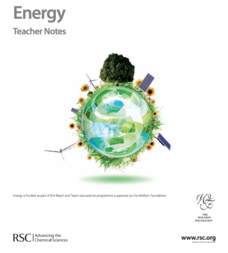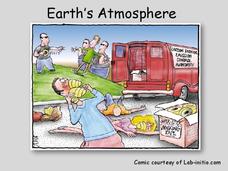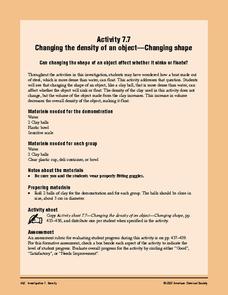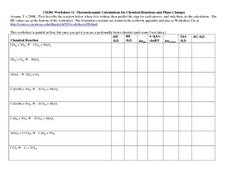Royal Society of Chemistry
Energy—Gifted and Talented Chemistry
What has more energy than a room full of pupils after a fire drill? This lesson plan! Explore the changes in energy during different chemical reactions, discover why some reactions feel cold and others feel hot, and tackle the concept of...
NOAA
The Incredible Carbon Journey: Play the Carbon Journey Game
Class members explore the carbon cycle in the final installment of the 10-part Discover Your Changing World series. They play a simulation game where they walk through the steps carbon takes as it cycles through the different layers of...
University of Georgia
Antacid and Uncle Heartburn
Household materials can be used for more than cleaning! In this collaborative experiment, emerging chemists use products such as vinegar and liquid antacid to explore chemical reactions that commonly occur in the human body.
Science Geek
Earth's Atmosphere
Ozone gas absorbs the harmful UV-B rays and helps protect humans. An informative presentation begins with the layers of the earth's atmosphere, the pressure and temperature in each of the layers, the ozone layer, the ozone cycle, and the...
Space Awareness
Fizzy Balloons - C02 in School
Carbon dioxide is a very important gas; it is present in the air, used in cooking, and supports plant and animal life. Scholars investigate the properties of carbon dioxide with three different activities. They experience a color change,...
Curated OER
SAFETY KNOWLEDGE BASE CHANGES
Middle schoolers research and formulate a hypothesis for research to correlate changing safety regulations in regards to personal and environmental safety polices for storage, handling and disposal of chemicals, risk involved in...
Curated OER
Chemical Bonding
Students classify compounds as ionic or covalent. In this chemical bonding lesson plan, students experiment with 6 chemical compounds. They test physical properties such as the melting point, the solubility and the electrical...
Curated OER
Types of Chemical Reactions
In this chemical reactions worksheet, students read about the 3 types of chemical equations and how to write balanced ionic equations. Students are given 5 equations to balance, write the type of reaction, write the total ionic equation,...
Curated OER
Climate Change: Is there a Controversy
Students explore climate changes. For this climate changes lesson, students research what causes changes. Students search the Internet, summarize reports they find and create a poster with the information.
Curated OER
Climate Change
Students discuss problems associated with a world climate change. They examine how animals would be affected if the world heated up.
Curated OER
WS 10.2 Chemical Bonding in Alkanes
In this bonding instructional activity, students write the chemical formula, the name of the alkane, the structural formula and the condensed formula given the number of carbon atoms in each alkane.
Curated OER
Getting to the Core of Climate Change
Learners investigate climate changes by graphing and analyzing ice core data from Greenland and Antarctica. They create, explain and report the pattern of data on a graph of ice core data. In addition they find relationships between the...
Curated OER
Evaporation and Temperature Change
Students investigate the relationship between evaporation and temperature changes. In this evaporation and changes in temperature lesson, students measure the changes in temperature of different solutions on a cotton ball.
Curated OER
Salt, To Use or Not To Use
Fifth graders develop a deeper understanding of chemical and physical changes. They explain how salt is made, used, and the affects it has on the body. They explain that salt in moderation is important to our health.
Curated OER
Ice Cream Science
Students review properties of matter and discuss how materials change when things are done to them. They observe how materials change as a reaction to temperature by following the procedure to make ice cream and recording the temperature...
Curated OER
Chemical Equilibrium
In this chemical equilibrium worksheet, students review hydration, dissociation, and colligative properties. Students also review Le Chatelier's principle. This worksheet has 15 short answer questions and 12 problems to solve.
American Chemical Society
Changing the Density of an Object - Changing Shape
Continuing with the concept of volume and its effect on density, learners now work with a piece of clay to see if they can get it to float in water. This is a memorable end to a seven-part investigation of density. Make sure to check out...
American Chemical Society
Changing State: Melting
Dry ice is extremely cold — it is -109.3°F or -78.5°C. Scholars observe and explain the molecular motion associated with melting. Then they design their own experiments to speed up the melting process. Finally, a teacher presents a...
American Chemical Society
Changing the Density of a Liquid - Adding Salt
Fourth in a set of several little lessons on density, this one compares the density of fresh and salt water. First by demonstration, and then by a hands-on activity, learners find that adding salt increases the density, as is evidenced...
American Chemical Society
Changing the Density of a Liquid - Heating and Cooling
During a unit on density, pupils ponder whether or not temperature affects this property. By carefully inserting blue cold water and yellow hot water into a room-temperature sample, they will see the answer. Make sure to have done the...
American Chemical Society
Changing State: Freezing
There are five types of frost: ground frost, air frost, hoar frost, glaze, and rime. Scholars mix ice and salt in a metal container to observe frost forming on the outside of the can. Animations and videos enhance the learning.
American Chemical Society
Changing State: Evaporation
Why do experiments require a control? Guide scholars through designing an experiment to see what they can do to evaporate water faster with a lesson that stresses the importance of controlling all variables. The second activity allows...
Curated OER
Exothermic and Endothermic Changes
Pupils define and identify endothermic/exothermic reactions. Using a series of experiments, they construct and interpret potential energy diagrams for their reactions.
Curated OER
Thermodynamic Calculations for Chemical Reactions and Phase Changes
In this thermodynamics worksheet, students describe the reactions given and then determine the thermodynamic calculations. This worksheet has 14 problems to solve.
Other popular searches
- Physical and Chemical Changes
- Chemical Changes in Matter
- Physical Chemical Changes
- Chemical Changes in Rocks
- Chemical Changes Rust
- Matter Chemical Changes
- Chemical Changes Indicators
- What Are Chemical Changes
- Rates of Chemical Changes
- Chemical Changes Rusting
- Chemical Changes of Matter
- Physical/chemical Changes

























